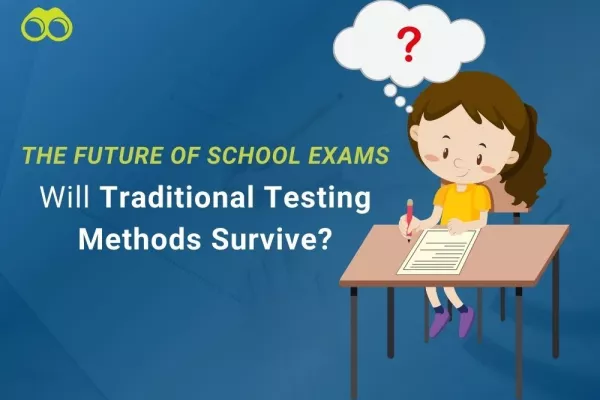Category: Skoodos

We all know how stressful school exams can be for our children. For years, traditional testing methods have been the cornerstone of the education system, serving as the primary way to assess students' knowledge and academic progress. However, with the world around us changing so fast, the approaches to education are changing, too.
In recent years, a long debate has been ongoing over the question of whether school examination methods should be substituted by or supplemented with new ones. With the current wave of personalized learning and skills-based progress, the question becomes a relevant one: Is this the time to stop, or is it the turn to continue using traditional testing models of education?
Traditionally, education revolved around memorizing facts and regurgitating the information on exams. In this model of education, which has been prevalent over the years, success has been measured by a student's ability to recall and reproduce knowledge on test papers.
Today, however, the educational landscape is shifting. Schools are increasingly emphasizing skills like critical thinking, problem-solving, creativity, and collaboration. These skills are seen as crucial for thriving in today’s rapidly changing world, where the ability to adapt, innovate, and think critically is more important than ever before.
This shift in focus has led to a rethinking of how we assess students. Traditional exams may test a student's ability to recall information, but they often fail to measure skills like creativity, collaboration, and practical problem-solving—skills that are essential for future success. As such, educators and policymakers are beginning to question whether traditional testing methods are sufficient in preparing students for the demands of the 21st century.
As with everything, traditional exams have pros and cons.
As educators seek to better assess students' abilities in a more comprehensive way, alternative assessment methods are gaining popularity. These methods aim to provide a broader and more accurate picture of a student's skills and capabilities.
Another positive development in technology is allowing more tailored assessments. Artificial intelligence and data analytics allow for instant feedback and tailored learning. It enables students to learn at their own pace, and the same can help teachers to evaluate their students beyond the scope of the usual exams.
Parents have a big role to play as the education system starts adopting more modern assessment methods.
Technology is playing an increasingly significant role in reshaping assessment. AI, virtual reality, and digital assessments can give better possibilities to provide more personalized, flexible, and engaging assessment.
Much potential exists as regards these technologies, such as a better chance toward increasing equity, access, etc. In all this sense, therefore, a good balance ought to prevail in teaching where technology-centered assessments exist and coexist with more traditional measures.
The future of school exams is likely to be the adaptation of hybrid models of assessment. This would combine traditional forms of assessment with alternative approaches to give a more balanced and comprehensive view of a student's abilities.
This would mean the likelihood of assessments that would look much more into an array of skills, like emotional intelligence, creativity, and social collaboration. Assessment systems around the world are bound to become increasingly sophisticated and education may become more tailored and learner-centric.
In conclusion, although the traditional school examination system will not completely disappear within the short term, it has been perceived to change with changes in educational demands. The future for assessments at school will entail more of a holistic system balancing between exams and alternatives like project-based assessments, portfolios, and digital-based assessment methods.
As parents, it's essential to stay informed about these changes and adapt our expectations accordingly. Supporting our children’s development of important skills, managing test anxiety, and encouraging a growth mindset are all key steps in helping them succeed in an evolving educational landscape.
If you’re looking for the best school for your child to ensure they receive a well-rounded education that prepares them for the future, consider visiting Skoodos. Skoodos helps parents make informed decisions by providing information on the best schools tailored to your child’s needs and strengths. Don’t wait—start your journey today and choose a school that values your child’s future beyond traditional exams!
 Blog: Recently Added
Blog: Recently AddedEvery year, thousands of parents across India type the same question into Google: which board i...
If you’re a parent in India today, you’ve probably heard about NEP 2020, but you may still be w...
Every parent who is looking at schools today eventually asks this question: If we don’t live in...
Every parent reaches a point where this question quietly starts coming up: Should we consider boardi...
For many families in India, choosing a school is one of the most important long-term decisions they...
For years, higher education in India came with an almost unspoken rule: if you want a “good” de...
For most parents, choosing a school isn’t just an academic decision; it’s emotional, stressful, and...
Deciding on a school today is quite different from what it was a decade ago. Parents are not just co...
While making a decision about a school is not a very easy task, it is now more complex.While making...
Selecting the proper school has never been an easy task. For parents of Indian children, it is often...

